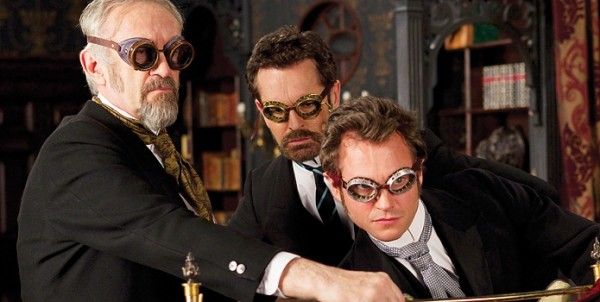Tanya Wexler's Hysteria is a silly little historical comedy and there's nothing wrong with that. The film is about the creation of the vibrator or as the opening title card tells us "The following is based on true events. Really." Going into Hysteria, I was initially worried that there might be an unsettling subtext implying the only way women can get over their problems is through sexual relief and they owe it all to ingenious men. Thankfully, that turned out not to be the case, although there's not much case at all other than to make the audience chuckle at citizens in Victorian England having orgasms and misunderstanding sex. Hysteria goes a little overboard at times with its self-aware pronouncements and unrealistic characters, but it is inarguably the best movie you'll see all year featuring Jonathan Pryce fingerblasting an old lady.In 1880, the catch-all diagnosis "hysteria" is affecting more than half of England's women. Hysteria covers insomnia, stress, depression, rebelliousness, and basically anything a man doesn't like about a woman. Disgusted by the primitive medical treatments of bloodletting and leeches, Progressive young doctor Mortimer Granville (Hugh Dancy) is disgusted by the primitive medical treatments like bloodletting and leeches, and joins the medical practice of Dr. Robert Dalrymple (Pryce) who specializes in treating the emotional afflictions of women. Dalrymple has devised a special medical treatment wherein the doctor lubricates his fingers and stimulates a woman's vaginal area in order to relieve stress, a practice which today is known by teenagers everywhere as "fingering". There's a charm to the unrealistic notion that neither party understands that what they're doing is sexual. To the characters in Hysteria, it's simply a medical procedure like any other. Mortimer has no problem with the new practice, but its growing popularity begins to cause him severe hand cramps. Enter Mortimer's eccentric upper-class friend (Rupert Everett) who has been trying to invent an electric feather duster. Using the duster to massage his hand, Mortimer realizes the machine's potential and decides to implement it at Dalrymple's practice. Unsurprisingly, it's a smashing success and everybody wins.This is where all the light comedy comes into play and the film handles it perfectly well. The plot is theme park history and shouldn't be taken too seriously, but it's impressive how much comedy a film can get out of having a proto-vibrator provide orgasms to women of the Victorian Age. There's also a childish innocence to having sex so far removed from science that neither party feels any awkwardness from what today would be perceived as a bizarre practice.
Mortimer has no problem with the new practice, but its growing popularity begins to cause him severe hand cramps. Enter Mortimer's eccentric upper-class friend (Rupert Everett) who has been trying to invent an electric feather duster. Using the duster to massage his hand, Mortimer realizes the machine's potential and decides to implement it at Dalrymple's practice. Unsurprisingly, it's a smashing success and everybody wins.This is where all the light comedy comes into play and the film handles it perfectly well. The plot is theme park history and shouldn't be taken too seriously, but it's impressive how much comedy a film can get out of having a proto-vibrator provide orgasms to women of the Victorian Age. There's also a childish innocence to having sex so far removed from science that neither party feels any awkwardness from what today would be perceived as a bizarre practice. And yet Hysteria feels like it has to be about something so it gives us Dalrymple's rebellious daughter Charlotte (Maggie Gyllenhaal). Mortimer is initially attracted to Dalrymple's prim and proper daughter, Emily (Felicity Jones), but he is eventually won over by Charlotte's independence and generosity of spirit towards the less fortunate. The script awkwardly positions Mortimer and Charlotte as two people who already know they're in a revolutionary time. For Mortimer, it's a scientific revolution of germ theory and sanitary conditions while Charlotte vocally expresses her knowledge that she's living in revolutionary time for women. The way they the characters about their present, it's as if someone from the future went back to their era and told them how history's verdict.Charlotte also feels like over-compensation for the possible criticism that the storyline is too male-oriented and only uses women as objects for gentle sex comedy. It's a reasonable defense, but Charlotte is so overdone that it feels like she's about one step away from burning her undergarments in protest. Her modern attitude diminishes the credibility of her character and the world in which she lives. While I don't think anyone will take Hysteria as a meticulously-detailed representation of 1880s England, there's a limit to how much a film can appeal to its audience's modern-day sensibilities before that trick is worn out.But it's impossible to get mad at Wexler's film. It's such a simple and good-natured movie that any animosity rolls away and the worst it can do is cause you to roll your eyes. Getting angry at Hysteria would be like getting angry at a Pop Tart.Rating: C+For all of our coverage of the 2011 Toronto International Film Festival, click here. Also, here are links to all of my TIFF 2011 reviews so far:
And yet Hysteria feels like it has to be about something so it gives us Dalrymple's rebellious daughter Charlotte (Maggie Gyllenhaal). Mortimer is initially attracted to Dalrymple's prim and proper daughter, Emily (Felicity Jones), but he is eventually won over by Charlotte's independence and generosity of spirit towards the less fortunate. The script awkwardly positions Mortimer and Charlotte as two people who already know they're in a revolutionary time. For Mortimer, it's a scientific revolution of germ theory and sanitary conditions while Charlotte vocally expresses her knowledge that she's living in revolutionary time for women. The way they the characters about their present, it's as if someone from the future went back to their era and told them how history's verdict.Charlotte also feels like over-compensation for the possible criticism that the storyline is too male-oriented and only uses women as objects for gentle sex comedy. It's a reasonable defense, but Charlotte is so overdone that it feels like she's about one step away from burning her undergarments in protest. Her modern attitude diminishes the credibility of her character and the world in which she lives. While I don't think anyone will take Hysteria as a meticulously-detailed representation of 1880s England, there's a limit to how much a film can appeal to its audience's modern-day sensibilities before that trick is worn out.But it's impossible to get mad at Wexler's film. It's such a simple and good-natured movie that any animosity rolls away and the worst it can do is cause you to roll your eyes. Getting angry at Hysteria would be like getting angry at a Pop Tart.Rating: C+For all of our coverage of the 2011 Toronto International Film Festival, click here. Also, here are links to all of my TIFF 2011 reviews so far:
- 360
- Alps
- The Artist
- The Awakening
- A Dangerous Method
- The Descendants
- Friends with Kids
- God Bless America
- Goon
- Hick
- The Hunter
- I'm Carolyn Parker
- The Ides of March
- Into the Abyss
- Killer Joe
- Melancholia
- Moneyball
- Pina
- Restless
- Salmon Fishing in the Yemen
- Shame
- The Skin I Live In
- Sleeping Beauty
- Ten Year

